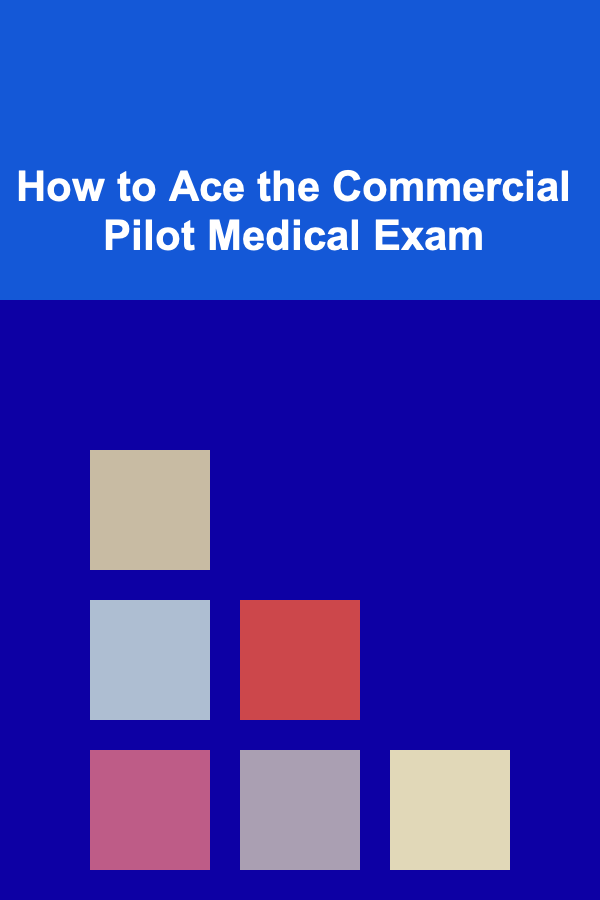
How to Ace the Commercial Pilot Medical Exam
ebook include PDF & Audio bundle (Micro Guide)
$12.99$8.99
Limited Time Offer! Order within the next:

Becoming a commercial pilot is a dream for many aviation enthusiasts, offering the thrill of flying alongside a rewarding career. However, one of the most critical steps in this journey is passing the Commercial Pilot Medical Exam . The medical exam is a mandatory requirement by the Federal Aviation Administration (FAA) or relevant aviation authorities around the world, ensuring that pilots meet specific physical and mental health standards to fly safely.
In this article, we will guide you through the various aspects of the commercial pilot medical exam, explaining the requirements, what to expect during the examination, and tips on how to prepare. We'll also dive into common misconceptions, how to handle health conditions, and the ways to maximize your chances of success in this rigorous test.
Understanding the Commercial Pilot Medical Exam
The commercial pilot medical exam is designed to evaluate your physical and mental fitness to safely operate an aircraft in a commercial capacity. The standards set by aviation authorities such as the FAA are stringent, ensuring that pilots have the necessary physical capabilities to respond to emergencies, operate aircraft under various conditions, and ensure safety for themselves, their passengers, and the crew.
The exam primarily focuses on three key areas:
- Physical Health -- Ensures that the pilot does not have any medical conditions that could impair their ability to operate an aircraft safely.
- Mental and Emotional Health -- Assesses the psychological state of the pilot to ensure they can handle the stress, decision-making, and cognitive load associated with flying.
- Visual and Hearing Acuity -- Pilots need to have excellent eyesight and hearing to navigate, communicate, and read instruments accurately.
Sub-categories of the Medical Exam
- Class 1 Medical: Required for commercial pilots (airline and non-airline). This is the most rigorous and has the highest health requirements.
- Class 2 Medical: For private pilots. Though not as strict as the Class 1, this still demands a high level of physical health.
- Class 3 Medical: Typically required for air traffic controllers, this class also applies to pilots, but is often less demanding.
Each of these medical certifications has different requirements in terms of eyesight, hearing, and general health.
Medical Requirements: What You Need to Know
The medical standards for commercial pilots are designed to ensure that the pilot's health is sufficiently strong to perform the duties required. Let's break down the key medical criteria.
2.1 Vision Standards
Good vision is essential for any pilot, as it is directly related to the ability to read instruments, spot other aircraft, and respond to navigational cues. Here are the basic visual standards for a commercial pilot:
- Distant Vision: Pilots must have 20/20 vision or 20/40 vision in both eyes, with or without correction (i.e., glasses or contact lenses). If you have corrective lenses, you must carry a spare pair during flight.
- Near Vision: Pilots must be able to read 16-inch print with both eyes, again with or without correction.
- Color Vision: Pilots must be able to perceive the colors of the aviation signals, such as lights, signs, and the cockpit's colored instruments. This test often involves identifying red, green, and white colors.
2.2 Hearing Standards
A commercial pilot must be able to understand spoken words clearly, which is necessary for communication with air traffic control and crew. The hearing standards typically require the ability to understand speech in a quiet environment, and in some cases, a hearing test in a soundproof room may be performed.
2.3 General Health Standards
This category encompasses a wide range of health conditions. A few key elements include:
- Blood Pressure: Your blood pressure should not exceed 155/95 mmHg at the time of the exam. If you have hypertension, it must be controlled with medication.
- Cardiovascular Health: Pilots must not have a history of heart conditions, such as heart attacks or significant arrhythmias. A cardiologist's approval may be required if you have a history of heart disease.
- Neurological Health: You must not have any history of epilepsy, seizures, or other neurological disorders. Medical documentation and assessments may be required if you have a history of neurological conditions.
- Diabetes: Pilots with diabetes must be well-controlled with medication. If you have diabetes, you must demonstrate a stable and well-managed condition.
2.4 Psychological and Cognitive Health
In addition to physical health, the FAA and other aviation authorities require that pilots demonstrate emotional stability and mental fitness for flying.
- Mental Health Screening: Pilots should have the ability to deal with stress, make quick decisions under pressure, and handle emotional challenges. In some cases, psychological testing may be required, especially if you have a history of mental health issues.
- Cognitive Function: Cognitive health is essential for understanding complex systems, making timely decisions, and navigating unpredictable situations. The FAA will ensure that pilots are free from mental disorders that might impair their cognitive function.
2.5 Other Considerations
- Sleep Apnea: If you have sleep apnea, you may need a sleep study or documentation proving it is well-controlled.
- Medications: Some medications may disqualify you from flying, especially those that impair judgment, reaction times, or cognitive function. Always check with your medical examiner to ensure the medications you're taking are acceptable.
What to Expect During the Medical Exam
The process of obtaining a commercial pilot medical certificate involves several steps. Here's what you can expect during the examination:
3.1 The Pre-Exam Process
Before the exam, you will need to provide your medical history, including any past surgeries, conditions, medications, or treatments. Be honest about your health history, as the FAA may require you to provide additional medical documentation or undergo further testing if necessary.
3.2 The Examination
The exam itself typically involves several components:
- Physical Examination: The examiner will check your weight, blood pressure, vision, and overall physical condition.
- Vision Test: You will undergo a visual acuity test, checking your distance and near vision, as well as color vision.
- Hearing Test: This test may involve a spoken word test or an audiometer test to assess your ability to hear clearly.
- Basic Health Check: Your blood pressure and heart rate will be measured, and the examiner will assess your overall physical health.
3.3 Medical Record Review
The examiner may also review your medical records or ask you to provide additional documentation. If you have any pre-existing medical conditions, it's essential to have documentation from your treating physician regarding the management of your condition.
How to Prepare for the Medical Exam
Preparation is key to acing the commercial pilot medical exam. Here are some tips to help you get ready:
4.1 Maintain Good Physical Health
- Exercise Regularly: Staying in good shape will help you meet the physical requirements of the exam.
- Eat Healthily: A balanced diet supports overall health, including maintaining normal blood pressure and healthy cholesterol levels.
- Manage Existing Conditions: If you have conditions like hypertension or diabetes, make sure they are under control before the exam.
4.2 Get Your Eyesight and Hearing Tested
If you wear corrective lenses or have any vision issues, make sure your prescription is up to date. For hearing, if you have any concerns about your hearing ability, it's a good idea to have an audiologist conduct a test before the exam.
4.3 Consult with a Physician
If you have a medical condition that might be disqualifying, consult with a specialist before your exam. They can provide documentation or assist you in managing the condition.
4.4 Stay Calm and Focused
The exam can be stressful, but staying calm and prepared will give you the best chance of passing. Trust in your preparation, and keep a positive mindset.
Common Reasons for Failing the Medical Exam
Several factors can disqualify a candidate from passing the commercial pilot medical exam, and some are common reasons for failure:
- Uncontrolled Hypertension
- Unmanaged Diabetes
- Vision or Hearing Issues
- Mental Health Conditions
- Chronic Illnesses or Disabilities
If you fail the exam, you can often appeal or seek further evaluation, but it's better to be proactive in managing your health before the exam.
Conclusion
Acing the Commercial Pilot Medical Exam is a crucial step on the path to becoming a commercial pilot. By understanding the medical requirements, preparing for the examination, and staying in good health, you can maximize your chances of success. Remember, the medical exam is not just about meeting the standards; it's about ensuring that you have the physical and mental fitness required to operate an aircraft safely and responsibly.
So, stay proactive, maintain a healthy lifestyle, and approach the exam with confidence.
Reading More From Our Other Websites
- [Home Rental Property 101] How to Handle Tenant Turnover Smoothly
- [Home Pet Care 101] How to Set Up a Pet First-Aid Kit for Emergencies at Home
- [Home Rental Property 101] How to Handle Rent Non-Payment Issues
- [Home Party Planning 101] How to Plan a Themed Dinner Party with Custom Decor
- [Polymer Clay Modeling Tip 101] Best Polymer Clay Sculpting Techniques for Hyperrealistic Animal Portraits
- [Home Storage Solution 101] How to Store Christmas Ornaments Efficiently: Keep Your Holiday Decorations Tidy Year-Round
- [Personal Care Tips 101] How to Use Body Wash for a Relaxing, Spa-Like Experience
- [Personal Care Tips 101] How to Pick a Body Spray Based on Your Personality
- [Personal Investment 101] How to Maximize Your 401(k) Contributions
- [Biking 101] How to Maintain Your Biking Gear for Long-Lasting Durability

How to Create a Meeting Preparation Checklist for Team Collaboration
Read More
How to Prepare for Inclement Weather on Yard Sale Day
Read More
How to Teach Editing Techniques for YouTube and Social Media Content
Read More
How to Use a Monolingual Dictionary Effectively
Read More
How to Master Backbends Safely
Read MoreHow to Build a Custom Bank Fee Expense Tracker in Excel
Read MoreOther Products

How to Create a Meeting Preparation Checklist for Team Collaboration
Read More
How to Prepare for Inclement Weather on Yard Sale Day
Read More
How to Teach Editing Techniques for YouTube and Social Media Content
Read More
How to Use a Monolingual Dictionary Effectively
Read More